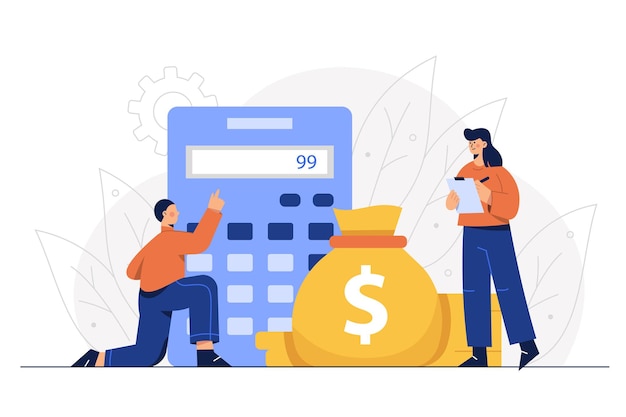Freelancing offers creative control, flexible hours, and the freedom to shape your own path. But that independence often comes with hidden pressures, such as unpredictable income, mounting expenses, and the burden of managing every financial risk alone. These challenges can quietly erode your focus and momentum.
The Unique Financial Struggles Freelancers Face
Financial burnout doesn’t arrive all at once. It grows through delayed payments, chronic stress, and the constant pressure to chase the next client. Without a system to manage both income and expectations, even the most resilient freelancers can feel overwhelmed. Avoiding that outcome requires more than discipline. It demands a clear strategy that supports your goals, preserves your well-being, and builds lasting stability.

While freelancing offers freedom, it also creates a financial landscape filled with uncertainty. One of the most common challenges is delayed payment. Even after completing a project, it can take weeks—or longer—for funds to arrive, making it difficult to cover basic expenses or plan ahead. Budgeting becomes guesswork when cash flow depends on inconsistent client behavior.
Taxes are another source of strain. Freelancers are responsible for tracking earnings, setting aside the right percentage, and paying quarterly installments. Missing a payment or miscalculating deductions can lead to penalties that compound over time. Health care costs, retirement savings, and insurance also fall entirely on the freelancer, often forcing tough decisions about what to prioritize. In these moments, adopting principles of frugal living can provide a buffer—helping you stretch income further while maintaining focus on long-term financial goals.
When income remains unstable, debt can quietly build. If that happens, it helps to pause and assess your financial situation, seeking financial management help to understand the full spectrum of available options. This might include credit counseling, consumer proposals, or even personal bankruptcy. These solutions exist to create structure when the numbers no longer add up, and exploring them early can prevent deeper financial damage.
Financial burnout doesn't start with one bad month. It starts when short-term fixes become long-term habits. Without a plan, even high earners can find themselves caught in a cycle of stress, juggling bills, taxes, and uncertainty with no margin for error.
Build a Financial Buffer: Prioritize an Emergency Fund
A late client payment should not send you into panic mode. But without a cushion, even a short delay can throw your finances into chaos.
Think of your emergency fund as a freelancer’s insurance policy. It covers the essentials when:
- A retainer unexpectedly ends
- You take time off for health or family
- Work slows down and leads dry up
How Much Should You Save?
Aim for three to six months of core expenses: rent, groceries, insurance, utilities, and business overhead. That’s your baseline. But don’t let the number intimidate you.
Start with a simple system:
- Set aside 10% from every invoice
- Use a separate account labeled “Do Not Touch”
- Build gradually, not perfectly
Even a few hundred dollars can make the difference between calm and crisis. The goal isn’t to save fast—it’s to save consistently.
When your emergency fund is in place, you buy yourself time. Time to wait out a dry spell. Time to choose better clients. Time to breathe.
Financial resilience starts with giving yourself that space.
Budgeting for Freelancers: Flexibility Is Key

A fixed monthly budget rarely works when income shifts from feast to famine. Freelancers need a system built for fluctuation—not frustration.
Start with two numbers:
- Your bare minimum: rent, groceries, phone bill, insurance
- Your comfortable target: adds savings, personal spending, and growth investments
This creates a flexible range rather than a rigid figure. When you earn more, scale up. When work slows down, revert to your essentials.
Make your money easier to manage by doing the following:
- Open separate accounts for taxes, savings, and spending
- Use a percentage system: for example, 50% to expenses, 30% to taxes, 20% to savings
Review your cash flow weekly, not monthly
Too many freelancers wait until tax season or a cash crunch to face the numbers. A flexible budget helps you stay in control—without feeling boxed in.
The more visibility you have into your finances, the less power uncertainty holds over you.
Diversify Income Streams to Reduce Stress
Relying on one client or service can leave your finances vulnerable. A single cancelled project might wipe out your income for the month. Building multiple income sources creates stability and reduces pressure during slower periods. From digital art selling to stock investments, find other ways to make money that can complement your main income sources.
Some freelancers develop retainers with trusted clients, offering consistent monthly work. Others create digital products—like templates, guides, or courses—that generate income without trading time for money. Taking on a part-time contract or offering short-term consulting can also fill in gaps without overwhelming your schedule.
Adding even a small stream of recurring income gives you more flexibility. It becomes easier to turn down low-value work and avoid the feast-or-famine cycle.
Client selection matters, too. Those who pay on time, communicate clearly, and return for future work provide more value than high-paying, one-off projects that cause stress and delays. Financial burnout often stems from unreliable income—not just low income.
Know When to Seek Help: Professional Support and Debt Solutions
Financial burnout doesn’t always look like panic. Sometimes, it’s the quiet dread when you open your bank app. The guilt of ignoring another tax notice. The mental fog from juggling too many underpaid jobs just to stay afloat.
You don’t have to carry that alone.
There’s power in getting help early
Speaking with a financial advisor or a licensed credit counselor gives you clarity, not judgment. They can walk you through real, legal options that match your situation—no guesswork, no shame.
You might qualify for:
- A consumer proposal that reduces what you owe
- A consolidation plan that simplifies repayment
- Or, when needed, bankruptcy to reset completely
These aren’t last resorts. They’re lifelines designed to stop the spiral and rebuild your financial stability.
The sooner you act, the more choices you keep. The longer you wait, the fewer you have.
Protect Your Mental Health Alongside Your Finances
Financial stress doesn’t stay in your spreadsheets. It shows up in your sleep, your mood, your energy. When every decision feels tied to money, your creativity and confidence take the hit.
That’s why protecting your mental health isn’t a luxury—it’s part of staying in business.
Build small habits that give your brain room to breathe:
- Set boundaries around when and how often you check your finances
- Schedule regular reviews to stay ahead of surprises instead of reacting to them
- Take breaks from productivity culture to remind yourself that rest is not the enemy of success
Freelancing is personal. The work, the money, the pressure—it’s all on you. But that doesn’t mean you have to burn out proving you can handle it.
The goal isn’t to remove stress entirely. It’s to manage it in ways that keep you steady, clear, and creative over the long haul.
Wrapping Up
Financial burnout isn't a sign that you're failing. It's a signal that your systems need support. As a freelancer, your income may vary—but your approach doesn't have to.
Build habits that protect your time, energy, and financial resilience. Make space for long-term thinking, even when short-term demands feel loud. Seek guidance when the numbers stop making sense.
Success in freelancing isn’t measured by how much you endure. It’s defined by how well you sustain the work you care about—without compromising your peace along the way.
(This article is not intended as financial advice and is for education and entertainment purposes only. You are responsible for your own financial decisions).



 What is Huel? The Ultimate Guide to Meals, Shakes, and Greens
What is Huel? The Ultimate Guide to Meals, Shakes, and Greens